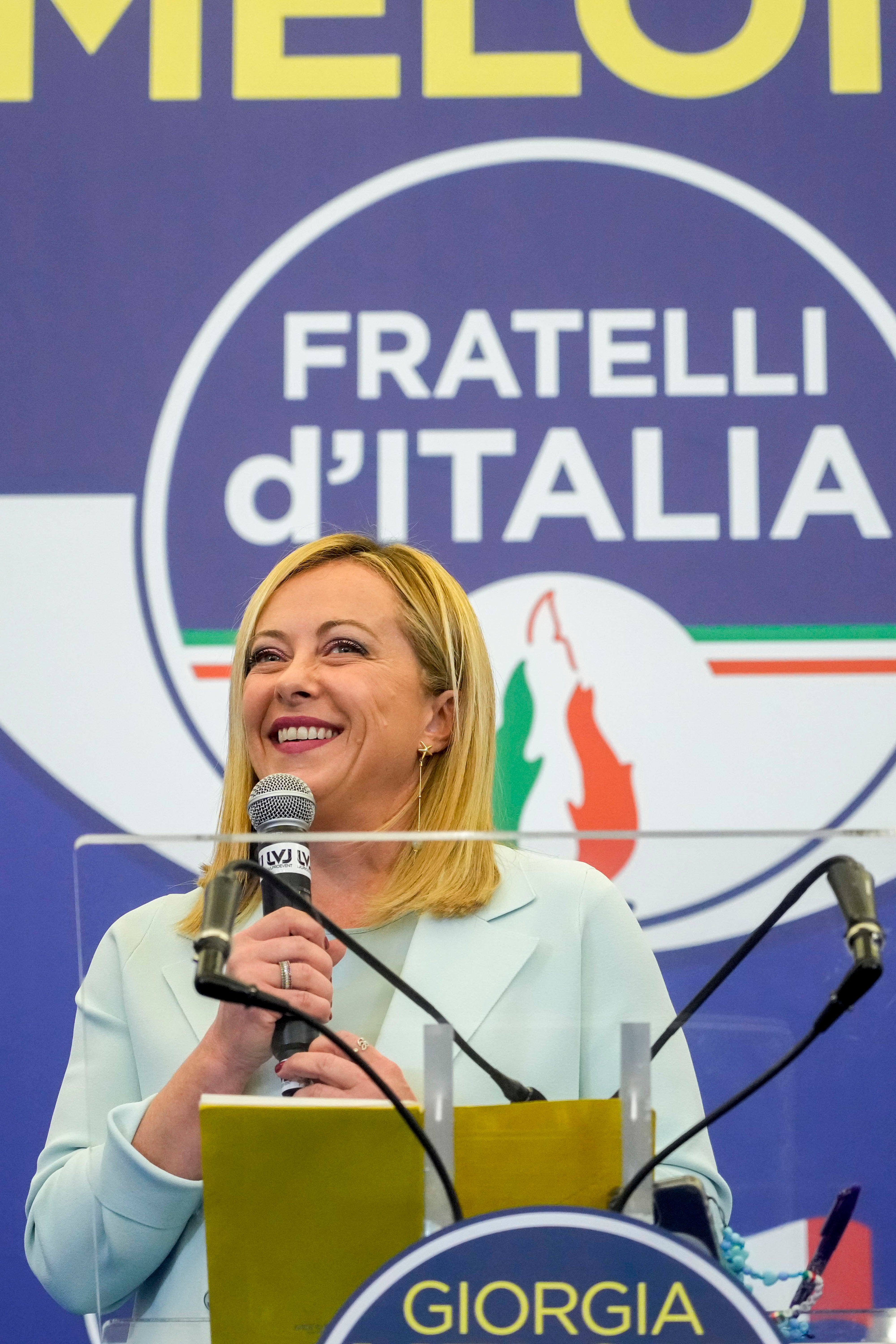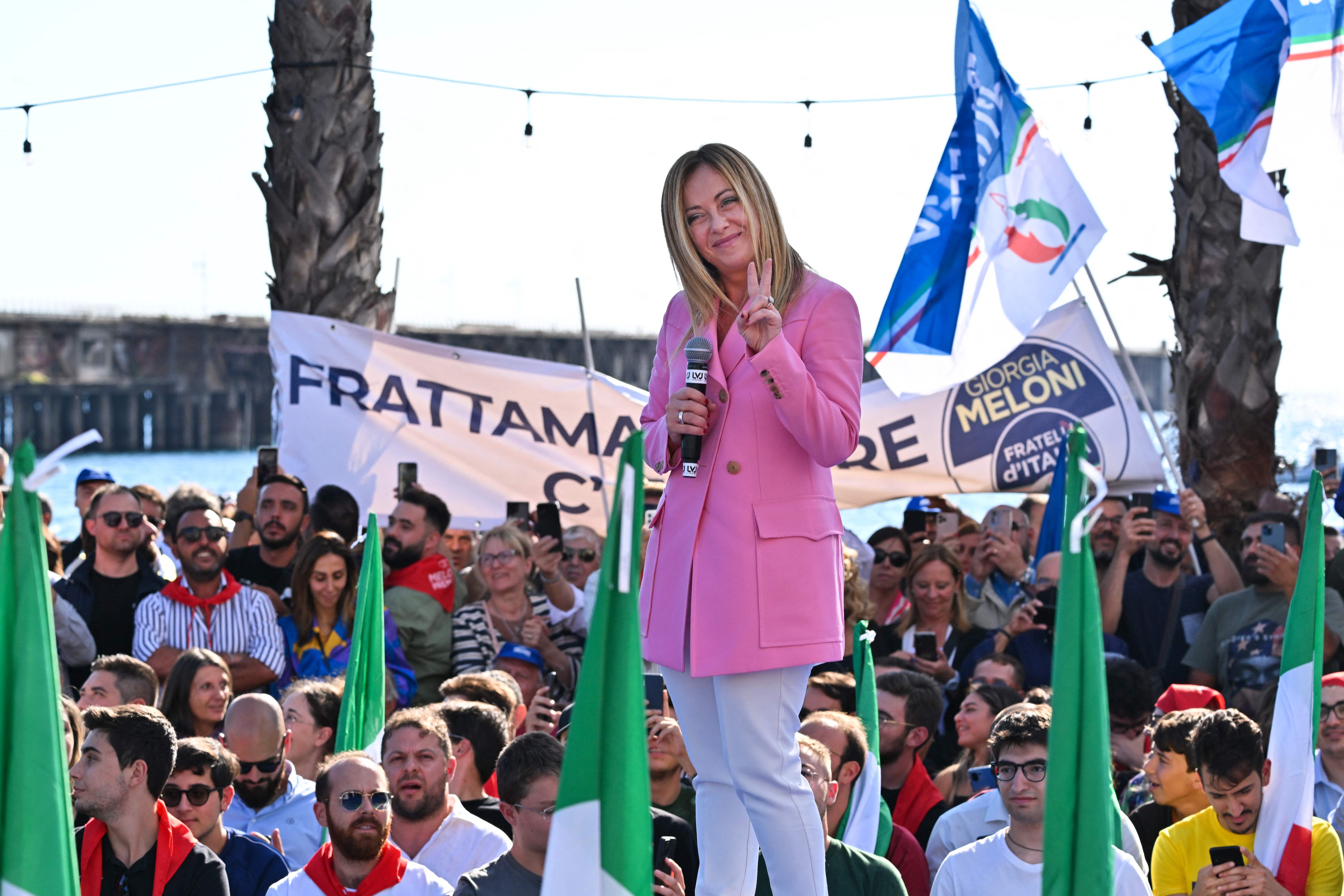Italy election: Where does right-wing Giorgia Meloni stand on Europe, immigration and LGBT issues?
Success of conservative leader has spooked observers despite claims she has renounced neo-fascist ties

Italy is on track for its most right-wing government since the Second World War as Giorgia Meloni’s arch-conservative party tops preliminary results from Sunday’s general election.
Ms Meloni, a 45-year-old Roman who has led Fratelli d’Italia (Brothers of Italy) on the margins of Italy’s politics for a decade, stormed to prominence in a snap election called after Mario Draghi’s coalition collapsed over the summer.
The outsider candidate is thought to have benefited from being the only major party leader who refused to join the government of national unity established under Mr Draghi last year.
A campaign alliance linking Ms Meloni to conservative allies Matteo Salvini and former prime minister Silvio Berlusconi gave Italy’s right wing an advantage over the disunited left-leaning parties.
Ms Meloni, who polled far ahead of her two allies, is primed to take charge of a new coalition as Italy’s first female prime minister.
While she has strained to demonstrate that her party has moved away from its neo-fascist roots, her historic positions on social and political issues have led observers to fear Italy will soon be under the control of the far-right for the first time since Benito Mussolini was toppled nearly 80 years ago.
Europe
Ms Meloni and her party have long held Eurosceptic views. She has previously called for the dissolution of the eurozone, saying it was “destined to implode”.

The Brothers have drifted towards the centre recently and stood on a platform committing the party to European integration.
Their leader has nonetheless told supporters that “in Europe they are a bit worried,” as under her leadership “Italy will start to defend its national interests, as others do”.
The party programme seeks a “more political and less bureaucratic” EU. “That does not mean that we want to destroy Europe, that we want to leave Europe, that we want to do crazy things,” Ms Meloni has said.
Ms Meloni is chair of the right-wing European Conservative and Reformist group in the European Parliament, which gathers her Brothers of Italy, Poland’s Law and Justice Party, Spain’s Vox and the Sweden Democrats, which just won big in elections there on a platform of cracking down on crime and limiting immigration.
France’s Emmanuel Macron and Germany’s Olaf Scholz were due to meet to discuss how to deal with Italy after the election, according to Reuters. The EU powerhouses reportedly fear Italy will become closer with Hungary and Poland, two nations who have rubbed against the bloc’s democratic standards.
“What the Italians I talked to in Rome said to me was: don’t throw her into Hungary’s arms,” a French government source told Reuters.
Immigration
“No to the violence of Islam, yes to safer borders, no to mass immigration, yes to work for our people,” Ms Meloni said in a speech in June which exhibited her hostility to what she considers foreign threats to traditional Christian European culture.
Ms Meloni warns against globalists who seek to “destroy our identity and our civilisation to turn us into undefined citizens of the world”.
She has called for a naval blockade to prevent migrant boats from leaving North African shores, and has proposed screening potential asylum-seekers in Africa, before they set out on smugglers’ boats to Europe.

Her alliance partner Mr Salvini held a hard line against migration when he served as interior minister in the coalition preceding Mr Draghi’s.
Under his tenure, migrants rescued by humanitarian ships were kept for days or weeks aboard the overcrowded vessels because he refused to quickly let them disembark. Prosecutors in Sicily had him indicted on kidnapping charges over his policy. He has been found innocent in one case; another trial in Palermo is still going on.
Thomas Christiansen, professor of political science at Rome’s Luiss University and the executive editor of the Journal of European Integration, noted that Italy has a tradition of pursuing a consistent foreign and European policy that is in some ways bigger than individual party interests.
“Whatever Meloni might be up to will have to be moderated by her coalition partners and indeed with the established consensus of Italian foreign policy,” Mr Christiansen said in an interview.
LGBT
“Yes to natural families, no to the LGBT lobby, yes to sexual identity, no to gender ideology, yes to the culture of life, no to the abyss of death,” Ms Meloni said in the same June speech where she rallied against immigration.
During the campaign, the conservative leader has repeatedly denied suggestions she might roll back legislation on abortion or gay rights, while reaffirming her opposition to adoptions and surrogacy for LGBT couples.
Italy, the home of the Catholic church, is already an outlier in western Europe on LGBT rights. Gay marriage is still banned and same-sex couples hoping for children effectively have to travel abroad to be recognised as parents.

The New York Times reported that as a member of parliament, Ms Meloni sought to extend Italy’s ban on surrogacy to stop homosexual parents who seek the process abroad from being recognised as surrogates in Italy.
Federico Mollicone, the Brothers of Italy culture spokesperson, caused a stir two weeks ago when he said a Peppa Pig episode with the lesbian polar bears, first aired in Britain, should not be broadcast in Italy to avoid “gender indoctrination”. Mr Mollicone last week said same-sex parenting was not normal.
Ukraine
A Meloni-led government is largely expected to follow Italy’s current foreign policy, including her pro-Nato stance and strong support for supplying Ukraine with weapons to defend against Russia’s invasion, even as her coalition allies stake a slightly different tone.
Both Mr Berlusconi and Mr Salvini have ties to Russian president Vladimir Putin.
While both have distanced themselves from his invasion, Mr Salvini has warned that sanctions against Moscow are hurting Italian industry, and even Mr Berlusconi has excused Mr Putin’s invasion as foisted on him by pro-Moscow separatists in the Donbas.






Join our commenting forum
Join thought-provoking conversations, follow other Independent readers and see their replies
Comments